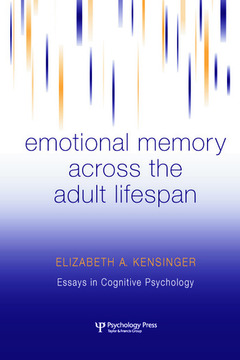Description
Emotional Memory Across the Adult Lifespan
Essays in Cognitive Psychology Series
Author: Kensinger Elizabeth A.
Language: English
Subject for Emotional Memory Across the Adult Lifespan:
Keywords
information; enhancement; items; medial; temporal; lobe; orbitofrontal; cortex; declarative; long; Urbach Wiethe Disease; Direct Modulatory Effect; Flashbulb Memory; Emotional Memory Enhancement; Nonemotional Information; Non-emotional Information; Emotional Version; Perirhinal Cortices; Narrated Slide Shows; Declarative Long Term Memories; Medial Temporal Lobe Regions; Emotional Working Memory; Hippocampal Memory System; Emotional Memory; Medial Temporal Lobe; Emotional Items; Working Memory; Working Memory Performance; Amygdala Damage; Mood Induction Procedures; Alzheimer’s Disease Patients; Weather Prediction Task; National Library; Amygdala Activity; Amygdala Atrophy
111.58 €
Subject to availability at the publisher.
Add to cartPublication date: 02-2009
Support: Print on demand
Publication date: 05-2015
· 15.2x22.9 cm · Paperback
Description
/li>Contents
/li>Biography
/li>
Though many factors can influence the likelihood that we remember a past experience, one critical determinant is whether the experience caused us to have an emotional response. Emotional experiences are more likely to be remembered than nonemotional ones, and over the past couple of decades there has been an increased interest in understanding how emotion conveys this memory benefit.
This book begins with a broad overview of emotion, memory, and the neural underpinnings of each, providing the reader with an appreciation of the complex interplay between emotion and memory. It then examines how emotion influences young adults? abilities to store information temporarily, or over the long term. It explains emotion?s influence on the memory processes that young adults use consciously and on the processes that guide young adults? preferences and actions without their awareness. This book then moves on to describe how each of these influences of emotion are affected by the aging process, and by age-related disease, providing the reader with a lifespan perspective of emotional memory.
Within each of the domains covered, the book integrates research from cognitive psychology, cognitive neuroscience, and neuropsychological perspectives, examining both the behavioral and thought processes that lead to emotion?s effects on memory and also the underlying brain processes that guide those influences of emotion.
This book will be of interest to researchers and graduate students in memory, emotion, and aging, working in the fields of cognitive psychology, cognitive or affective neuroscience, and developmental or lifespan psychology.
Part 1. Introduction and Background. 1. Emotion, Memory, and Their Interactions. 2. The Neurobiology of Emotion and Memory. 3. Methods for Investigating Emotion-Memory Interactions. Part 2. Emotional Memory in Young Adults. 4. Emotion’s Modulation of Implicit Memory. 5. Emotion’s Influence on Working Memory. 6. Emotion and Long-Term Memory Enhancements. 7. Aspects of Memory Enhanced by Emotion. 8. Emotion-Induced Memory Trade-offs. 9. Influences of Valence and Arousal on Emotional Memory. 10. Individual Differences in Young Adults’ Emotional Memories. Part 3. Emotional Memory in Older Adults. 11. Cognitive and Neural Changes with Advancing Age. 12. Emotional Processing in Old Age. 13. Aging and Emotional Working Memory. 14. When Aging Influences Effects of Emotion on Long-Term Memory. 15. Age-Related Positivity Biases. 16. Emotional Memory in Alzheimer’s Disease. 17. Summary and Conclusions.
Dr. Kensinger graduated summa cum laude from Harvard University in 1998, with a joint degree in Psychology and Biology. She pursued her Ph.D. in Neuroscience at the Massachusetts Institute of Technology, where she was awarded a Howard Hughes Medical Institute predoctoral fellowship and a National Science Foundation dissertation award. After receipt of her Ph.D. in 2003, she held a postdoctoral research position at the Athinoula A. Martinos Center for Biomedical Imaging at Massachusetts General Hospital, supported by fellowships from the Massachusetts Biomedical Research Corporation and the National Institutes of Mental Health. In 2006, she joined the faculty of Boston College as an Assistant Professor of Psychology, where she heads the Cognitive and Affective Neuroscience laboratory. Dr. Kensinger has received numerous awards for her research and teaching, including young investigator research awards from the American Federation for Aging Research and the Dana Foundation. She is Associate Editor of the journal Cognition and Emotion, and she sits on the editorial boards of Memory and Cognition and Journal of Experimental Psychology. She has authored or co-authored over 60 research articles and book chapters, and she has been an invited symposium speaker at many universities as well as at national and international conferences.




